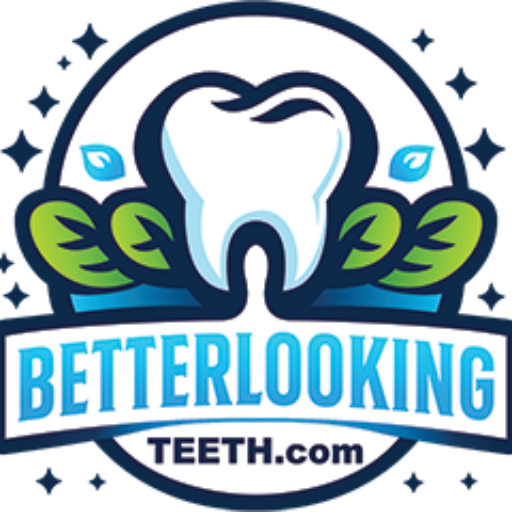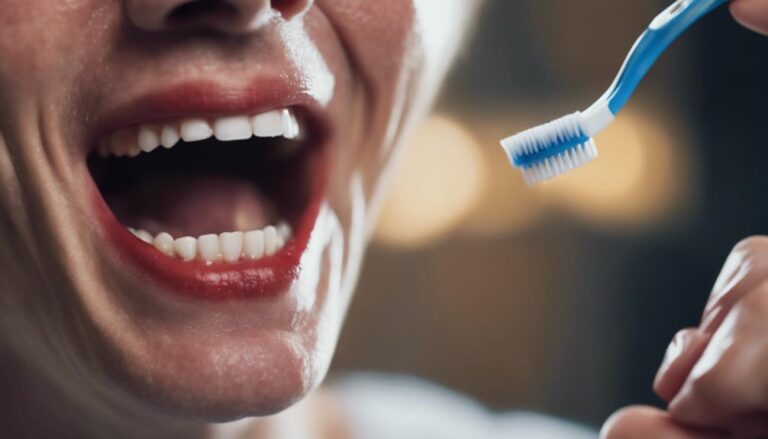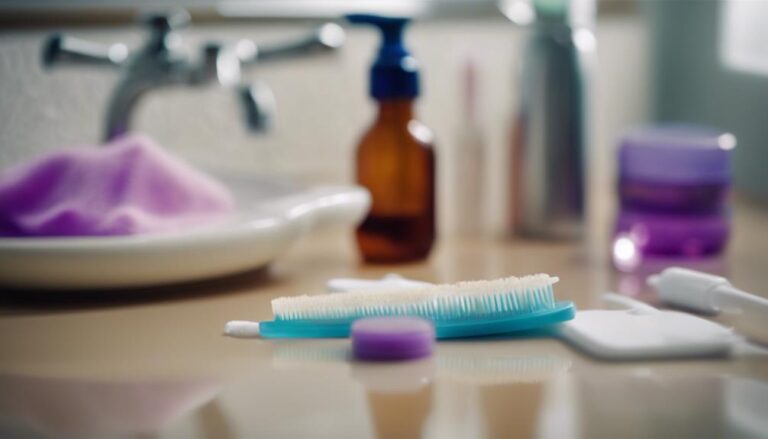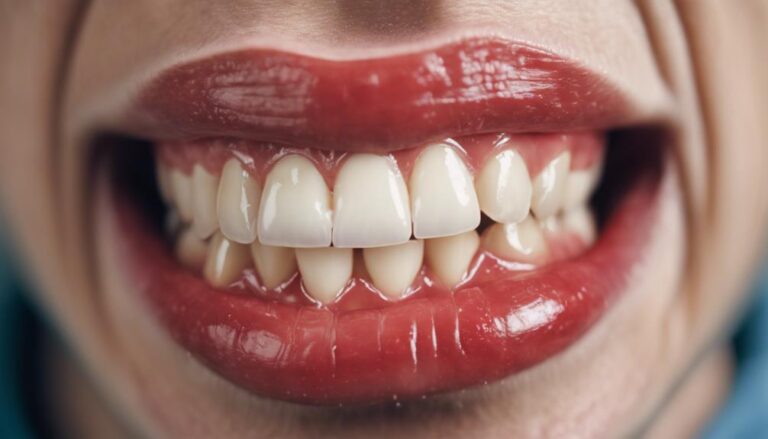Maintaining good oral hygiene is essential to preventing bad breath and gum disease. I recommend brushing twice daily with fluoride toothpaste, flossing to remove plaque between teeth, and using mouthwash for added protection. Proper brushing techniques, like gentle circles and cleaning the tongue, are important. Stay hydrated, manage stress, and quit smoking to further safeguard oral health. Remember, early detection through regular dental check-ups is crucial. These strategies form a strong foundation for a healthy mouth and fresh breath. Additional tips and insights can further enhance your oral care routine.
Key Takeaways
- Brush teeth with fluoride toothpaste and floss daily.
- Use mouthwash with fluoride and don’t rinse immediately.
- Clean tongue to remove bacteria and freshen breath.
- Stay hydrated to promote saliva production and oral health.
- Manage stress and maintain regular dental check-ups.
Importance of Oral Hygiene
Maintaining good oral hygiene is essential for preventing bad breath and gum disease. Oral health habits play an important role in keeping our mouths healthy. Regular brushing, flossing, and dental check-ups are key preventive measures that help in reducing the risk of developing oral health issues.
Brushing twice a day with fluoride toothpaste removes plaque, a sticky film of bacteria, and food particles that can lead to bad breath and gum disease. Flossing daily is equally vital to clean between the teeth where toothbrush bristles can’t reach.
In addition to brushing and flossing, using an antiseptic mouthwash can help reduce bacteria in the mouth. Proper tongue cleaning is another oral health habit that’s often overlooked but can have a significant impact on bad breath. A tongue scraper or simply brushing the tongue with a toothbrush can help eliminate odor-causing bacteria. By incorporating these oral health habits into our daily routine, we can take proactive preventive measures to maintain fresh breath and healthy gums.
Brushing Techniques for Fresh Breath
To guarantee fresh breath, mastering proper brushing techniques is crucial to effectively removing plaque and preventing gum disease. When it comes to brushing techniques, using the right tools is essential. Opt for a soft-bristled toothbrush to prevent damage to your gums and enamel. Make sure your toothbrush head is small enough to reach all areas of your mouth comfortably. Remember to replace your toothbrush every three to four months or sooner if the bristles become frayed.
Incorporate a gentle circular motion when brushing, making certain you cover all surfaces of your teeth. Divide your mouth into quadrants and spend at least 30 seconds on each section. Don’t forget to brush your tongue as well to remove bacteria and keep your breath fresh.
For your morning routine, brush your teeth before breakfast to start the day with a clean mouth. In the evening, brush before bed to remove food particles and plaque accumulated throughout the day. By mastering proper brushing techniques and using effective tools, you can maintain fresh breath and promote excellent oral health.
Flossing for Healthy Gums
When flossing daily, remember to gently glide the floss between each tooth to effectively remove plaque and debris for healthy gums. Proper flossing techniques are vital for maintaining excellent gum health as part of your daily routine.
- Flossing Techniques: Utilize a gentle back-and-forth motion to guide the floss below the gum line, ensuring thorough plaque removal. Avoid snapping the floss against your gums, which can cause irritation.
- Proper Tools: Choose floss that suits your preference, whether it’s waxed, unwaxed, tape, or a floss pick. The key is to use a product that enables you to maneuver easily between your teeth.
- Gum Health, Daily Routine: Make flossing an essential part of your daily oral care regimen. Consistent flossing helps prevent gum disease by eliminating plaque buildup in areas your toothbrush may not reach effectively.
Mouthwash Benefits and Usage
Using mouthwash daily can provide additional benefits to your oral hygiene routine beyond brushing and flossing. Mouthwash benefits include reducing plaque buildup, freshening breath, and fighting bacteria that cause gum disease. One common myth is that mouthwash alone can replace brushing and flossing, but it’s important to use mouthwash as a complement to these practices, not a substitute. When choosing a mouthwash, look for one that contains fluoride to strengthen teeth and kill bacteria effectively.
To maximize mouthwash benefits, it’s essential to use it correctly. After brushing and flossing, pour the recommended amount of mouthwash into a cup and swish it around your mouth for about 30 seconds, making sure to reach all areas, including the gumline. Avoid rinsing your mouth with water immediately after using mouthwash to allow its active ingredients to continue working.
Incorporating mouthwash into your daily oral care routine can help maintain good oral health and prevent issues like bad breath and gum disease. Remember, consistency is key when reaping the benefits of mouthwash.
Tongue Cleaning for Odor Control
For effective control of mouth odor, incorporating tongue cleaning into your daily oral hygiene routine is essential. The tongue harbors a significant amount of bacteria that can contribute to bad breath if not properly addressed. Here are three key reasons why tongue cleaning is vital for maintaining fresh breath and good oral health:
- Bacteria Removal: The surface of the tongue can accumulate bacteria over time, leading to unpleasant odors. By gently cleaning the tongue with a tongue scraper or a toothbrush, you can effectively remove these odor-causing bacteria, promoting fresher breath.
- Taste Buds: Regular tongue cleaning can also help improve your sense of taste. When the taste buds are free from debris and bacteria, they can function optimally, enhancing your ability to taste and enjoy food.
- Hydration Balance: A clean tongue supports hydration balance in the mouth, which is essential for overall oral health. Proper hydration helps maintain saliva production, which plays a significant role in neutralizing acids and protecting the teeth against decay.
Healthy Diet for Oral Health
Incorporating a nutrient-rich diet is essential for promoting excellent oral health and preventing dental issues. A diet that promotes nutritional balance plays a vital role in maintaining healthy teeth and gums. Here are some dietary recommendations to support ideal oral health:
| Food Group | Examples | Benefits |
|---|---|---|
| Dairy | Milk, yogurt, cheese | Rich in calcium for strong teeth |
| Fruits and Vegetables | Apples, carrots, spinach | High in vitamins and antioxidants for gum health |
| Protein | Lean meat, poultry, beans | Provides essential nutrients for tissue repair |
Regular Dental Check-ups
A key aspect of maintaining excellent oral health is ensuring regular dental check-ups. Here are three compelling reasons why these check-ups are essential:
- Prevention of Dental Issues: Regular dental check-ups help prevent the development of serious oral health problems. Dentists can detect early signs of gum disease, cavities, or other issues that could lead to bad breath if left untreated.
- Addressing Dental Anxiety: For those with dental anxiety, regular visits can help alleviate fears and build a trusting relationship with the dental team. Open communication about concerns can lead to a more comfortable experience and better oral health outcomes.
- Oral Cancer Screenings: Routine dental check-ups often include screenings for oral cancer. Early detection greatly improves the chances of successful treatment. Dentists are trained to identify suspicious lesions or abnormalities in the mouth that may require further investigation.
Avoiding Tobacco Products
To maintain excellent oral health, avoiding tobacco products is essential. Quitting smoking is one of the most impactful decisions you can make for your dental hygiene. Tobacco products, including cigarettes and chewing tobacco, not only stain teeth but also lead to gum disease and bad breath. Smoking weakens your immune system, making it harder for your body to fight off infections in the mouth, ultimately increasing the risk of gum disease. Additionally, the chemicals in tobacco products can cause a decrease in saliva production, which is essential for maintaining a healthy mouth environment.
If you’re struggling to quit smoking, consider seeking support from healthcare professionals or smoking cessation programs. It’s important to remember that quitting smoking not only benefits your oral health but also your overall well-being. In cases where quitting tobacco altogether is challenging, exploring tobacco alternatives like nicotine patches or gum can be a step towards reducing the harmful effects on your oral health. Making a commitment to avoid tobacco products is a significant step towards preventing bad breath and gum disease.
Hydration and Saliva Production
Ensuring sufficient hydration levels is essential for promoting saliva production, which plays a pivotal role in maintaining a healthy oral environment.
Saliva stimulation and hydration benefits are vital for oral health. Here are three key points to keep in mind:
- Water Intake: Drinking an adequate amount of water throughout the day is essential for saliva production. Dehydration can lead to decreased saliva flow, which in turn can contribute to bad breath and gum issues.
- Chewing Sugar-Free Gum: Chewing sugar-free gum can help stimulate saliva production. The act of chewing signals to the body that food is entering the mouth, triggering saliva release to aid in digestion and maintain oral moisture.
- Moisturizing Foods: Consuming hydrating foods such as fruits and vegetables can also support saliva production. These foods not only provide essential nutrients but also help keep the mouth moist, reducing the risk of dry mouth and related oral health problems.
Stress Management for Oral Health
Managing stress effectively is essential for maintaining excellent oral health and preventing potential issues like gum disease and bad breath. High levels of stress can weaken the immune system, making the body more susceptible to infections, including those that affect the gums and mouth. To combat stress and its notable impact on oral health, incorporating relaxation techniques and mindfulness exercises into your daily routine can be highly beneficial.
Relaxation techniques such as deep breathing, progressive muscle relaxation, and guided imagery can help reduce stress levels. These practices not only calm the mind but also have physical benefits like lowering blood pressure and reducing muscle tension, which can indirectly benefit oral health.
Mindfulness exercises, such as meditation and yoga, can also aid in stress management. By staying present in the moment and focusing on breathing and bodily sensations, mindfulness can alleviate anxiety and promote overall well-being, including oral health. Prioritizing stress management alongside regular oral hygiene practices can considerably contribute to a healthier mouth and body.
Proper Denture Care
Stress management plays an important role in oral health, and now shifting our focus to Proper Denture Care, maintaining dentures clean and well-fitted is essential to prevent potential oral health issues.
- Regular Cleaning: Clean dentures daily with a soft-bristle brush and mild soap or denture cleaner to remove food particles and prevent plaque buildup.
- Proper Storage: Store dentures in a clean, moist-free container when not in use to prevent warping or damage.
- Regular Check-ups: Visit your dentist regularly for adjustments and to make sure that your dentures fit properly, as ill-fitting dentures can lead to gum irritation and infections.
Taking care of your dentures through proper maintenance and cleaning techniques is vital for preventing bad breath and gum disease. By following these simple steps, you can ensure that your dentures remain in good condition and contribute to your overall oral health.
Understanding Gum Disease Symptoms
Maintaining good oral hygiene is vital in recognizing early signs of gum disease. Gum disease, also known as periodontal disease, can lead to serious oral health issues if left untreated. Being aware of the symptoms is essential for effective gum disease prevention. Common symptoms of gum disease include red, swollen, or tender gums, bleeding while brushing or flossing, receding gums, persistent bad breath, and loose or shifting teeth. If you experience any of these symptoms, it’s important to consult with a dental professional promptly.
Regular dental check-ups and cleanings play a significant role in oral health awareness by allowing early detection and treatment of gum disease. Proper oral hygiene practices, such as brushing twice a day, flossing daily, and using an antiseptic mouthwash, are key components of gum disease prevention. Maintaining a balanced diet and avoiding tobacco products also contribute to overall oral health. By staying informed about gum disease symptoms and practicing good oral hygiene habits, you can effectively prevent and manage this common dental issue.
Early Detection for Prevention
To effectively prevent gum disease, early detection through regular dental check-ups and awareness of potential symptoms is essential. Early intervention and preventive measures play a pivotal role in maintaining excellent oral health. Here are three key strategies for early detection to prevent gum disease:
- Regular Dental Check-ups: Scheduling routine dental visits allows for the early detection of any signs of gum disease. Dentists can identify subtle changes in the gums and provide guidance on preventive measures to stop the progression of the disease.
- Awareness of Symptoms: Being aware of common symptoms such as bleeding gums, persistent bad breath, and gum recession is crucial. Recognizing these signs early on enables prompt action, preventing further complications.
- Proactive Care: Implementing proactive measures at home, such as thorough oral hygiene practices and a balanced diet, can greatly reduce the risk of developing gum disease. Consistent oral care routines complement regular cleanings and professional care, contributing to long-term gum health.
Professional Cleanings and Treatments
Professional dental cleanings and treatments are essential components of maintaining excellent oral health and preventing gum disease. Regular visits to a dental hygienist for professional cleanings help remove plaque and tartar buildup that regular brushing and flossing may miss. These cleanings aid in preventing gum disease by reducing the risk of inflammation and infection in the gums. Additionally, professional dental cleanings can help in the early detection of oral health issues, allowing for timely intervention and preventive measures to be implemented.
During these appointments, dentists can also provide expert advice on proper oral hygiene practices tailored to individual needs. They can offer guidance on effective brushing and flossing techniques, recommend oral care products, and address any concerns or questions regarding oral health. Professional treatments such as fluoride applications or dental sealants may also be recommended based on the specific oral health needs of the individual. By following expert advice and scheduling regular cleanings, individuals can greatly reduce the risk of developing gum disease and maintain excellent oral health.
Lifestyle Habits Impacting Oral Health
Implementing healthy lifestyle habits is essential for maintaining excellent oral health and preventing potential dental issues. When it comes to lifestyle habits impacting oral health, two key factors play a significant role: diet impact and oral habits.
- Diet Impact: Consuming a balanced diet rich in vitamins and minerals is important for oral health. Foods high in sugar and acidity can contribute to tooth decay and gum disease. Opt for crunchy fruits and vegetables that help clean teeth naturally and increase saliva production, which aids in protecting the teeth.
- Oral Habits: Consistent oral hygiene practices such as brushing at least twice a day and flossing daily are essential for preventing plaque buildup and maintaining healthy gums. Additionally, using an antimicrobial mouthwash can help reduce bacteria in the mouth. Avoid habits like smoking or excessive alcohol consumption, as they can negatively impact oral health.
Frequently Asked Questions
Can Bad Breath Be a Sign of a More Serious Health Condition?
Bad breath can signal more severe health issues. Medical conditions like respiratory infections or diabetes can cause halitosis. It’s essential to address underlying causes as bad breath might be a warning sign of larger health implications.
How Often Should I Replace My Toothbrush for Optimal Oral Hygiene?
I change my toothbrush every 3 months for top-notch oral hygiene. It guarantees effective brushing technique and maintains good bristle condition. This practice helps prevent bacteria buildup, ensuring a clean and healthy mouth.
Are There Specific Foods That Can Help Prevent Bad Breath?
Eating foods like parsley, apples, and yogurt can help maintain breath freshness. Natural remedies such as green tea and probiotics also combat mouth odor. Incorporating these food choices into my diet benefits my oral health.
Can Genetics Play a Role in the Development of Gum Disease?
In the intricate dance of dental health, genetic predisposition casts a shadow on the development of gum disease. Yet, with diligent oral hygiene habits, one can sway the outcome towards a path of prevention and maintenance.
Is There a Connection Between Oral Health and Heart Disease?
Maintaining good oral health is essential as research suggests a link between oral health and cardiovascular health. Poor oral hygiene can lead to inflammation, which may contribute to heart disease. Regular dental check-ups are vital for overall well-being.
Conclusion
To sum up, maintaining good oral hygiene is essential for preventing bad breath and gum disease. By following reliable strategies such as proper brushing techniques, regular flossing, using mouthwash, cleaning your tongue, and understanding gum disease symptoms, you can keep your mouth healthy and fresh.
Early detection and professional cleanings are also key in preventing oral health issues. Remember, your lifestyle habits play a significant role in the health of your teeth and gums.






